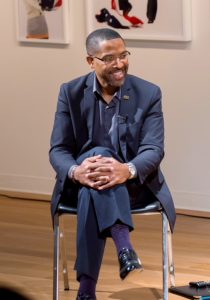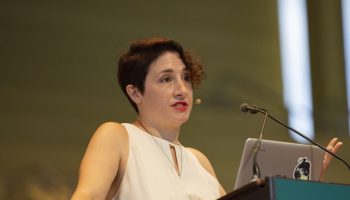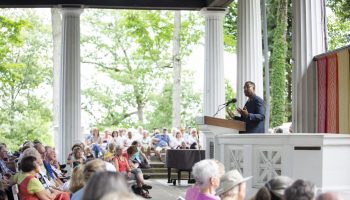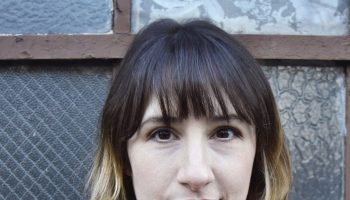As a scholar of African-American social thought, Corey D. B. Walker has traced the history of black political discourse and its influence on American democracy. Through his studies of American triumph and strife, Walker concludes that the nation is still an evolving “political project.”
“In many ways, we still are contesting the very grounds on which we understand our nation,” he said.
At 2 p.m. Thursday, July 26, in the Hall of Philosophy, Walker will present his lecture “Is America Possible? An Ethics of Dissent in an Empire of Dissent” as part of the Week Five interfaith theme, “The Ethics of Dissent.”
Walker, vice president and dean of the Samuel DeWitt Proctor School of Theology of Virginia Union University and former chair of the Africana Studies program department at Brown University, will use his background as an educator to inform Chautauquans about America’s history of divisiveness and its effects on modern democracy.
“We are at a moment where we have heightened levels of contestation between competing camps: those who (want to) see America as moving away from its idealistic destiny and those who see that we may need to go back and reclaim what made America great,” Walker said. “Both of those positions, and the infinite number of positions in between, really demonstrate that America is a political project yet to be completed.”
Walker’s study of African-American influence on democracy and societal divisions involve several academic disciplines. As an ordained American Baptist clergy person and author of A Noble Fight: African American Freemasonry and the Struggle for Democracy in America, he uses the intersection of politics and religion to inform his research.
What interests me is how African-Americans have developed political languages that not only challenge our democratic norms, but also open up alternative spaces for us to rethink the very idea of the political community,” he said. “I think that’s where it becomes so generative of the work that I’ve done. I’ve moved from African-American Freemasons and their schools of democracy to now looking at how our religious practices and religious languages, particularly in public, really challenge and constrains our ideas of democracy.”
As a graduate of Harvard University and seasoned professor, Walker has lectured to a variety of audiences. These experiences, he said, have demonstrated the need to engage all races and socioeconomic demographics.
“Having taught at some of our nation’s most elite institutions, from the University of Virginia to Brown University, as well as at historically black colleges, I’ve always taught and spoken with diverse audiences,” he said. “In each one of them, what I’m finding is that there are folks that are trying to grapple with the question of how do we forge a common language and a common identity?”
Walker continues to strive for nationwide engagement and seeks answers in his personal academia. Currently, he is finalizing his next book, Between Transcendence and History: An Essay on Religion and the Future of Democracy in America.
He said he is eager to share his ideas on the evolution of American democracy at the Institution, though he recognizes that a single lecture is only the first step in progressive action.
“What I find so unique about Chautauqua is leveraging this convening power to bring a diverse group of voices together to allow us the space to think and engage in public and with one another,” he said. “In many ways, there are no guarantees with these conversations. That’s the very risk of it, but it’s also the greatest reward.”





